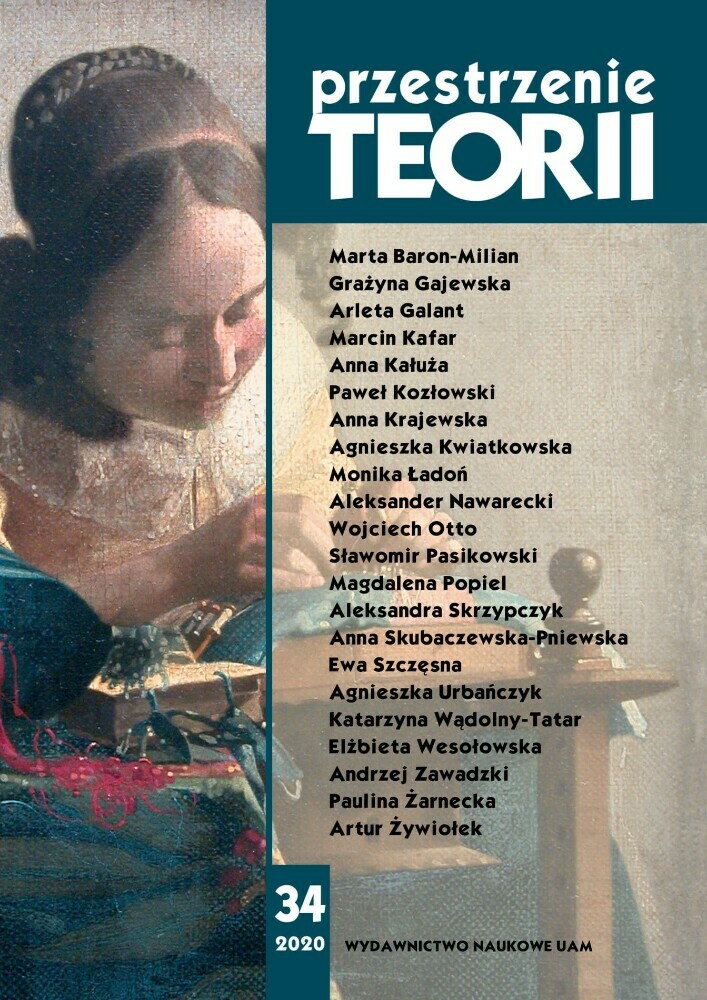Abstrakt
This paper examines the history and the shape of contemporary fanfiction repositories. The notion of an archive – one that is often used to describe such spaces, and appears in their names – is contrasted with Griselda Pollock’s proposal of a virtual feminist museum. Though for decades there have been attempts at preserving fan fiction (mostly created by women, non-canonical and transgressive), the stories had been subjected to selection and censorship. With the disappearance of such practices, the repositories start to embody Pollock’s notion. At the same time, however, as the lack of censorship causes economic problems, the virtuality of such ‘museums’ no longer denotes their digital nature but their evanescence.
Bibliografia
Archive of Our Own, <https://archiveofourown.org/> [dostęp: 12.02.2021].
Bacon-Smith C., Enterprising Women. Television Fandom and the Creation of Popular Myth, Philadelphia 1992.
beatrice-otter, [I don’t read, for example…], <https://beatrice-otter.tumblr.com/post/150017919557/tomato-greens-joestrummin-i-didnt-realise-ao3> [dostęp: 4.02.2019].
Burgess J., Your Support Helps the OTW Preserve Fanworks, <http://www.transformativeworks.org/your-support-helps-the-otw-preserve-fanworks/> [dostęp: 4.04.2019].
Bury R., Cyberspaces of Their Own. Female Fandoms Online, New York 2005.
Coppa F., A Brief History of Media Fandom, [w:] Fan Fiction and Fan Communities in the Age of the Internet, red. K. Hellekson, K. Busse, Jefferson, NC 2006.
Curtis M.E., Fanfiction.net statistics, <http://www.alternateuniverses.com/ffnstats.html> [dostęp: 25.01.2019].
De Kosnik A., Rogue Archives. Digital Cultural Memory and Media Fandom, Cambridge, MA 2016.
Derrida J., Archive Fever. A Freudian Impression, tłum. E. Prenowitz, Chicago 1995.
elfwreck, [Is there any way…], https://elfwreck.tumblr.com/post/183847463689/purge-of-2002-of-2012-what-are-those [dostęp: 5.04.2019].
FanFiction.Net, [w:] TVTropes, <https://tvtropes.org/pmwiki/pmwiki.php/Website/Fan-FictionDotNet> [dostęp: 4.02.2019].
FanFiction.Net, <https://www.fanfiction.net/> [dostęp: 4.02.2019].
FanFiction.Net’s NC-17 Purges: 2002 and 2012, [w:] Fanlore, <https://fanlore.org/wiki/FanFiction.Net%27s_NC-17_Purges:_2002_and_2012> [dostęp: 4.02.2019].
Forum Literackie Mirriel, <http://forum.mirriel.net/> [dostęp: 4.02.2019].
Foucault M., Archeologia wiedzy, przeł. A. Siemek, Warszawa 1977.
Gillam L., Gather ‘round the Campfire: Fanfiction.net and Participatory Writing, <http://www.trickster.org/symposium/symp95.html> [dostęp: 4.04.2019].
Jenkins H., Textual Poachers. Television Fans and Participatory Culture, New York 1992.
Jenkins H., Who the &% is Henry Jenkins?, <http://henryjenkins.org/aboutmehtml/> [dostęp: 4.02.2019].
Kobus A., Fandom. Fanowskie modele odbioru, Toruń 2018.
Kuny T., A Digital Dark Ages? Challenges in the Preservation of Electronic Information, referat zaprezentowany w czasie 63rd IFLA Council and General Conference
w Kopenhadze (1997), <http://archive.ifla.org/IV/ifla63/63kuny1.pdf> [dostęp: 25.01.2019].
LiveJournal.com, <https://www.livejournal.com/> [dostęp: 4.02.2019].
Lulu, Gender, <http://centrumlumina.tumblr.com/post/62816996032/gender> [dostęp: 25.01.2019].
Meggers H.J., Discovering the Authentic Sexual Self. The Role of Fandom in Transformation of Fans’ Sexual Attitudes, [w:] Fan culture. Theory/practice, red. K. Larsen, L. Zubernis, Newcastle 2012.
Morrisey K., Fandom then/now. The Participants, <http://katiedidnt.net/fandomthennow/pages/surveydemographics.html> [dostęp: 25.01.2019].
Organization for Transformative Works, Geocities rescue project, <http://www.transformativeworks.org/geocities-rescue-project/> [dostęp: 4.02.2019].
Pollock G., Encounters in the Virtual Feminist Museum, London 2007.
Russ J., Magic Mommas, Trembling Sisters, Puritans & Perverts. Feminist Essays, New York 1985.
Sendlor Ch., FanFiction.Net member statistics, <http://ffnresearch.blogspot.com/2010/07/fanfictionnet-users.html> [dostęp: 4.02.2019].
Stanfill M., Exploiting Fandom. How the Media Industry Seeks to Manipulate Fans, Iowa 2019.
Strikethrough and Boldthrough, [w:] Fanlore, <https://fanlore.org/wiki/Strikethrough_and_Boldthrough> [dostęp: 4.02.2019].
systlin, [Shit like the Great Purges…], <http://systlin.tumblr.com/post/183058659650/purge-of-2002-of-2012-what-are-those> [dostęp: 5.04.2019].
Taylor D., The Archive and the Repertoire: Performing Cultural Memory in the Americas, Durham, NC 2003.
tomato-greens, [it wasn’t, like, ~~~we luv pedophilia…], <http://tomato-greens.tumblr.com/post/148787203881/joestrummin-i-didnt-realise-ao3-was-started-in> [dostęp: 4.02.2019].
Trekiverse, Spock/McCoy Pairing, <http://www.trekiverse.org/tos/S--Mc-1.html> [dostęp: 25.01.2019].
Urbańczyk A., Bezimienność i izolacja. Anonimowość fanek – od fanzinów do nowych mediów, „Maska” 2018, nr 39 (3).
Urbańczyk A., Subwersja, nie sztuka. Korzenie, założenia i problemy fan studies, „Przestrzenie Teorii” 2018, nr 29.
Wayback Machine, fanfiction.net, February 4, 2019, <https://web.archive.org/web/20190204000127/https://www.fanfiction.net/> [dostęp: 4.02.2019].
Wayback Machine, mylog.pl, <https://web.archive.org/web/20041001000000*/mylog.pl> [dostęp: 4.02.2019].
Wikipedia:Fancruft, Wikipedia, <https://en.wikipedia.org/wiki/Wikipedia:Fancruft> [dostęp: 4.02.2019].
Williams R., The Long Revolution, Westport, CT 2001.
Licencja
Autorzy
Autorzy tekstów przyjętych do publikacji w czasopiśmie „Przestrzeniach Teorii” są zobowiązani do wypełnienia, podpisania i odesłania na adres redakcji umowy o udzielenie nieodpłatnej licencji do utworów, z zobowiązaniem do udzielania sublicencji CC.
Zgodnie z umową, autorzy tekstów opublikowanych w czasopiśmie „Przestrzeniach Teorii” udzielają Uniwersytetowi im. Adama Mickiewicza w Poznaniu niewyłącznej i nieodpłatnej licencji oraz zezwalą na użycie sublicencji Creative Commons Attribution-NonCommercial-NoDerivatives 4.0 International (CC BY-NC-ND 4.0).
Autorzy zachowują prawa do dalszego, swobodnego rozporządzania utworem.
Autorzy, którzy wykorzystują w swoim tekście cudze utwory (np. ilustracje, fotografie) proszeni są o dostarczenie do redakcji czasopisma zgodę na publikację od uprawnionych podmiotów.
Użytkownicy
Zainteresowani użytkownicy internetu uprawnieni są do korzystania z utworów opublikowanych po 2015 roku „Przestrzeniach Teorii” tylko w calach niekomercyjnych, pod następującymi warunkami:
- uznanie autorstwa - obowiązek podania wraz z rozpowszechnionym utworem, informacji, o autorstwie, tytule, źródle (odnośniki do oryginalnego utworu, DOI) oraz samej licencji;
- bez tworzenia utworów zależnych - utwór musi być zachowany w oryginalnej postaci, nie można bez zgody twórcy rozpowszechniać np. tłumaczeń, opracowań.
Do wszystkich tekstów opublikowanych przed 2015 r. prawa autorskie są zastrzeżone.
Inne
Uniwersytet im. Adama Mickiewicza w Poznaniu zachowuje prawo do czasopisma jako całości (układ, forma graficzna, tytuł, projekt okładki, logo itp.).

